Access to safe drinking water, sanitation and hygiene still remains out of reach for billions of people worldwide. According to the United Nations, half of the world’s population faces water scarcity at least one month a year. Yet, demand for water is steadily increasing as the world’s population grows and sectors such as agriculture and energy require more.
Sustainable Development Goal 6 (SDG 6) aims to ensure availability and sustainable management of water and sanitation for all. Engineers are well-positioned to collaborate with other industries to innovate for improved access to water and more sustainable water use across the communities that depend on this crucial yet finite resource.
Case study
Collaborative action to sustainably tackle water scarcity
Llano Grande, a community on the outskirts of Mexico City, had no households connected to a public water supply and only 59 households out of 110 had sanitary installations.
A collaborative network of water experts from around the world carried out extensive consultations with the community of Llano Grande. Following this, a Frontiers-funded group of UK academics, led by Mirella di Lorenzo, worked with Mexico-based NGO Fomento Mexicano, local stakeholders from NGOs, government bodies and water companies to develop an effective water management and resilience strategy.
They successfully installed a rainwater harvesting and purification system at the local school, which can now provide more than 65% of the community’s water needs, with a capacity of over 450,000 litres per year.
Insights
Embracing holistic solutions in the WEFE nexus
As climate change worsens, adequate access to water resources, energy supplies, food security, and ecosystems, there has never been a more urgent time to advance holistic solutions. Participants of the Frontiers ‘The nexus in action’ symposium came together to discuss how to build climate-resilient and inclusive futures within the water-energy-food-environment nexus (WEFE). In the discussions, the Frontiers community explored ways to accelerate progress in developing holistic solutions within the WEFE nexus:

Water is everybody’s business. – Professor Iqbal Mujtaba FREng, session chair for the Frontiers symposium
- Climate change is worsening many WEFE nexus issues, such as drought impacting food production and water availability. Solutions to tackle these challenges must be co-created with local communities and tailored to their capacities, needs, resources, and goals.
- Developing resilient and sustainable infrastructure for water accessibility requires adapting to different contexts, including climates, stakeholders, and political environments.
- Cultivating driven and reliable collaborators and mentors can help ensure progress for water solutions, even when funding is limited. Collaborative efforts involving local government and communities, nongovernmental organisations (NGOs), and the private sector are crucial for impactful projects.
- Accessing climate finance for WEFE projects requires innovative approaches such as circular economy models, mapping environmental impacts, and developing private-public partnerships.
SDG 6 in action
In the Zimbabwean region of Kariba, Dr Sally Weston is working on a project that aims to empower communities to build up forests and local biodiversity using a nexus approach.
The project is educating local farmers on conservation farming practices that help to increase agricultural yields, improving food security. These practices also reduce the need to cut down forests to cultivate more land, which, in turn, helps to better regulate local temperatures and enhances water cycling. In addition, Sally and her team are helping local communities start sustainable honey cultivation, which offers an additional income source that does not damage forests and supports local biodiversity.
Resources
Collaboration is essential for the success of projects that aim to tackle interconnected challenges within the WEFE nexus, such as water scarcity and its impact on issues such as food security. Frontiers programme participants shared insights that they have acquired in effectively identifying and engaging collaborators across different regions and industries:
- Collaboration is key to the success of development projects that tackle challenging and multidisciplinary issues. Collaboration and connection require effort and fostering new relationships can lead to future cooperation. Take advantage of opportunities to network with new people.
- Communication can make or break collaborative projects. Clear communication requires understanding cultural differences, being open-minded, preparing ahead of time, and being flexible to others’ needs and limitations.
- Anticipate and understand potential barriers that can show up in collaborative projects. Partnerships often encounter barriers that can limit the ability to forge new collaborations or continue with collaborative projects.
Looking for more resources on this topic?
For more insights, tools, and tips like the ones in this report, check out all the Frontiers content available in our resources section
